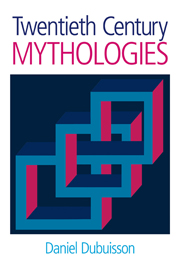Book contents
- Frontmatter
- Epigraph
- Contents
- Foreword by Professor Robert A. Segal
- Preface
- Abbreviations
- Introduction: History and comparative epistemology
- Part I Georges Dumézil, or Society
- Part II Claude Lévi-Strauss, or the Mind
- Part III Mircea Eliade, or the Sacred
- 12 Fascism and mysticism
- 13 Primitive ontology
- 14 The eternal return of anti-Semitism
- 15 The neo-paganism of homo religiosus
- 16 Metaphysics and politics: Eliade and Heidegger
- Addendum III Esotericism and fascism
- Addendum IV The reconstruction of prehistoric religions
- Addendum V The Eliadean conception of symbolism
- Addendum VI Forgetting the Shoah
- Conclusion: Modern theories of myth and the history of Western thought
- Bibliography
- Index
Addendum III - Esotericism and fascism
from Part III - Mircea Eliade, or the Sacred
- Frontmatter
- Epigraph
- Contents
- Foreword by Professor Robert A. Segal
- Preface
- Abbreviations
- Introduction: History and comparative epistemology
- Part I Georges Dumézil, or Society
- Part II Claude Lévi-Strauss, or the Mind
- Part III Mircea Eliade, or the Sacred
- 12 Fascism and mysticism
- 13 Primitive ontology
- 14 The eternal return of anti-Semitism
- 15 The neo-paganism of homo religiosus
- 16 Metaphysics and politics: Eliade and Heidegger
- Addendum III Esotericism and fascism
- Addendum IV The reconstruction of prehistoric religions
- Addendum V The Eliadean conception of symbolism
- Addendum VI Forgetting the Shoah
- Conclusion: Modern theories of myth and the history of Western thought
- Bibliography
- Index
Summary
As a discipline the history of religions will never look exactly like the other social sciences. The complexity and even at times the strangeness of the facts under study, the imperfect and no doubt impossible laicization of all of the problems posed, the deep “metaphysical” resonances of some of its interrogations, and the crucial interpretations that arise from these – all inevitably favour the composition of ambiguous work that, under its name and its scientific authority, delivers unreserved apologias of bizarre and partisan theses. Thus I was able to point out, in Chapter 2, that next to its paganbased ontology, its archaizing nostalgia for agrarian society, and its pungent traces of anti-Semitism, this work manifested a disturbing sympathy for occult movements, mysteries, gnoses, and initiation-based societies, as well as for individuals such as René Guénon, who, when not openly advocating ideals of a fascist or National Socialist nature (in the manner of Julius Evola), referred to secret traditions invariably reserved for a small elect.
My point here will be limited to completing and developing these latter indications by analysing the Eliadean conception of religion in the light of all that these notions – often obscure and poorly known – presuppose, and that historians generally leave to the margins. But is it not in this metaphysico-political hodge-podge, found at the crossroads of esotericism and fascism, that Eliade definitively situated the very essence of religious facts and authentic religious life?
- Type
- Chapter
- Information
- Twentieth Century Mythologies , pp. 243 - 258Publisher: Acumen PublishingPrint publication year: 2006

